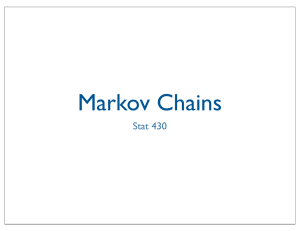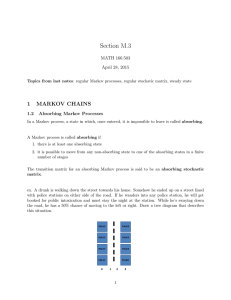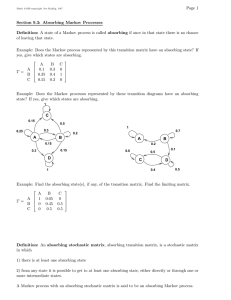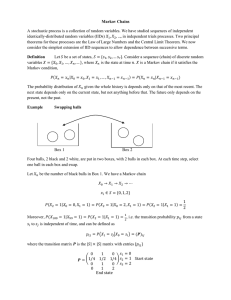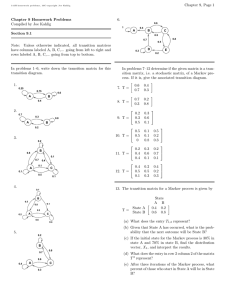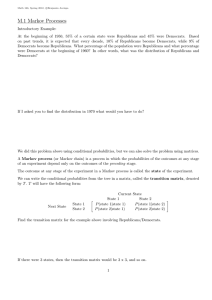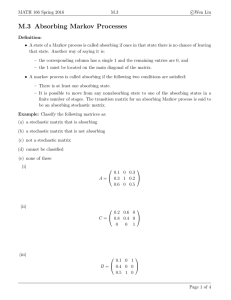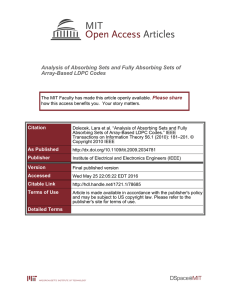Page 1 Week in Review # 10 Section M.2: Regular Markov Processes
advertisement
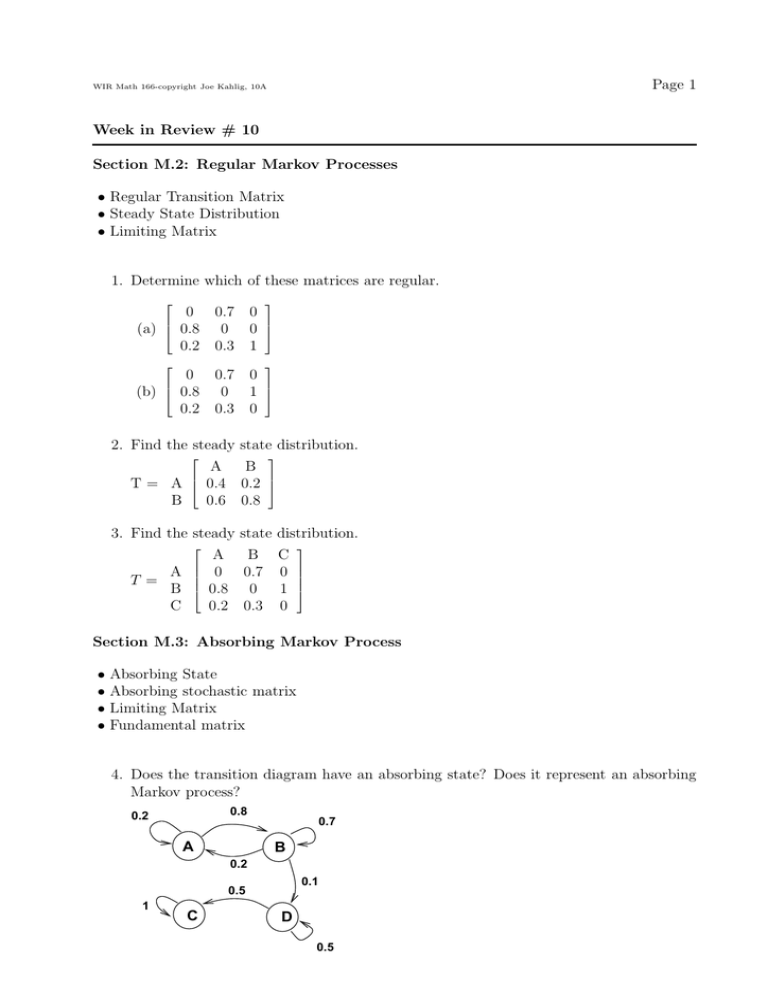
Page 1 WIR Math 166-copyright Joe Kahlig, 10A Week in Review # 10 Section M.2: Regular Markov Processes • Regular Transition Matrix • Steady State Distribution • Limiting Matrix 1. Determine which of these matrices are regular. 0 0.7 0 (a) 0.8 0 0 0.2 0.3 1 0 0.7 0 (b) 0.8 0 1 0.2 0.3 0 2. Find the steady state distribution. A B T = A 0.4 0.2 0.6 0.8 B 3. Find the steady state distribution. T = A B C A B C 0 0.7 0 0.8 0 1 0.2 0.3 0 Section M.3: Absorbing Markov Process • • • • Absorbing State Absorbing stochastic matrix Limiting Matrix Fundamental matrix 4. Does the transition diagram have an absorbing state? Does it represent an absorbing Markov process? 0.8 0.2 A 0.7 B 0.2 0.1 0.5 1 C D 0.5 Page 2 WIR Math 166-copyright Joe Kahlig, 10A 5. Does the transition diagram have an absorbing state? Does it represent an absorbing Markov process? 0.8 0.2 A 0.7 B 0.3 0.1 0.5 1 C D 0.4 6. Does the transition matrix represent an absorbing Markov process A (a) T = B C D A (b) T = B C D A B 0.4 0 0 1 0.6 0 0 0 C D 0.7 0 0 0 0.3 0 0 1 A B 0.1 0 0.3 1 0.6 0 0 0 C D 0.6 0 0.1 0 0.3 0 0 1 7. Find the limiting Matrix. A B C D A B 0.1 0 0.3 1 0.4 0 0.2 0 C D 0.5 0 0.1 0 0.3 0 0.1 1 Page 3 WIR Math 166-copyright Joe Kahlig, 10A 8. Use the transition matrix to answer the following. A B C D E A B 1 0 0 1 0 0 0 0 0 0 C 0 0 1 0 0 D 0.1 0.2 0.1 0.4 0.2 E 0.1 0 0.1 0.5 0.3 (a) Find the limiting Matrix. (b) What is the probability that if you start in state D you will end up in state B? (c) What is the probability that if you start in state E you will end up in state C? (d) Find the fundamental matrix. (e) What is the expected number of iterations of the Markov process if you start in State D? (f) If you start in state E, what is the expected number of times that you would be in state D before entering an absorbing state? Page 4 WIR Math 166-copyright Joe Kahlig, 10A 9. A mouse is placed in one of the compartments of the maze. The mouse takes two minutes to randomly select a door and then leaves the compartment. If the mouse enters another compartment, the procedure is repeated. The exit doors of the maze are one-way and thus once a mouse leaves the maze it can not return. A Exit B Exit C (a) Find the transition matrix and the limiting matrix. (b) If the mouse starts in room A, what percent of the time will it exit the door in room C? (c) Find the fundamental matrix. (d) If the mouse begins in room A, what is the expected amount of time it will spend in the maze? (e) If the mouse begins in room A, what is the expected amount of time it will spend in room B? (f) If the mouse begins in room B, what is the expected amount of time it will spend in room C?

